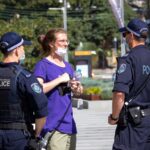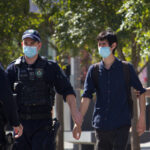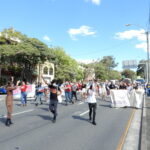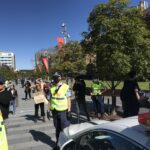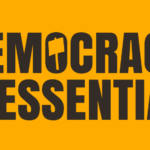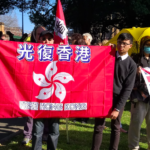Sydney University Caught Colluding With NSW Police Over Protests: The SRC’s Jack Mansell Speaks Out
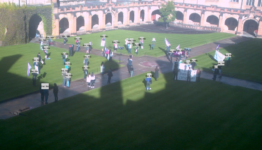
Since late July, reports on the overpolicing of COVID safe student and staff demonstrations at Sydney University have been doing the rounds of both social and mainstream media.
Riot squad, mounted and general duties officers have all been deployed in a disproportionate manner on campus.
On a number of occasions, students have related that certain individuals were being singled out as NSW police moved in to disband protests, as it seemed officers had been referring to a list with organisers names on it.
From the perspective of students, the police crackdown on campus protest had been underway prior to the actions that caught the attention of many in July. Indeed, those studying at the uni had a hunch that staff were colluding with law enforcement for some time before the escalation.
And a recent development has shown this was no conspiracy theory. Via freedom of information laws, students were able to obtain copies of emails sent between a senior uni staff member and NSW police officers outlining details about on campus organising with a view to stamping it out.
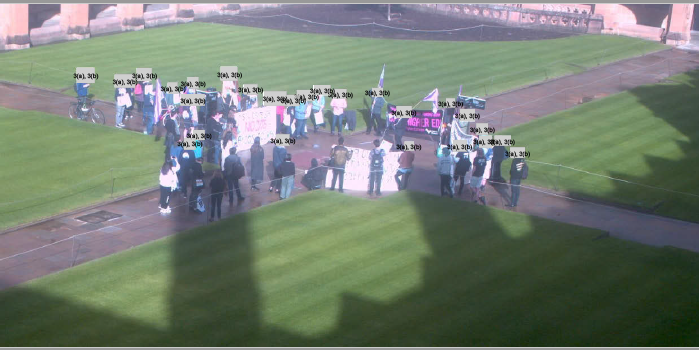
A sordid little affair
The emails obtained under state freedom of information laws are all from late May this year, and they’re between the University of Sydney protective services manager and various senior officers at the Inner West Police Area Command.
The Sydney Uni manager is seen to initiate the correspondence asking NSW police as to whether photos of students assembling in public would constitute a mass gathering under the COVID-19 public health order on gatherings and therefore be illegal.
The exchanges go on to see the protective services manager producing images of students mobilising, screenshots of Facebook event pages, and measurements of certain areas within the university where students might gather and break the COVID four square metre rule.
NSW police subsequently requests further information about a “possible protest”, so it can “ensure a suitable” response.
And one of the last emails produced by the university staff member relates that a protest is in progress and claims that students are breaching social distancing rules.
Set to escalate
An early email from police to uni management asserts COVID rules are not for policing protests. But, by September, other correspondence shows police stating that groups of under 20 spread out around campus with signs indicating the same political cause would be breaching health orders.
These days, it seems that busting up Sydney Uni student rallies has become a pet fetish of NSW police. At one point, officers went so far as to show up and intimidate a student lunch time organising meeting of less than 20 people held in a park.
Sydney Criminal Lawyers spoke to Sydney University Student Representative Council (SRC) education officer Jack Mansell about the implications of staff coordinating with law enforcement like this, why students weren’t surprised about it, and how the student movement is only just underway.
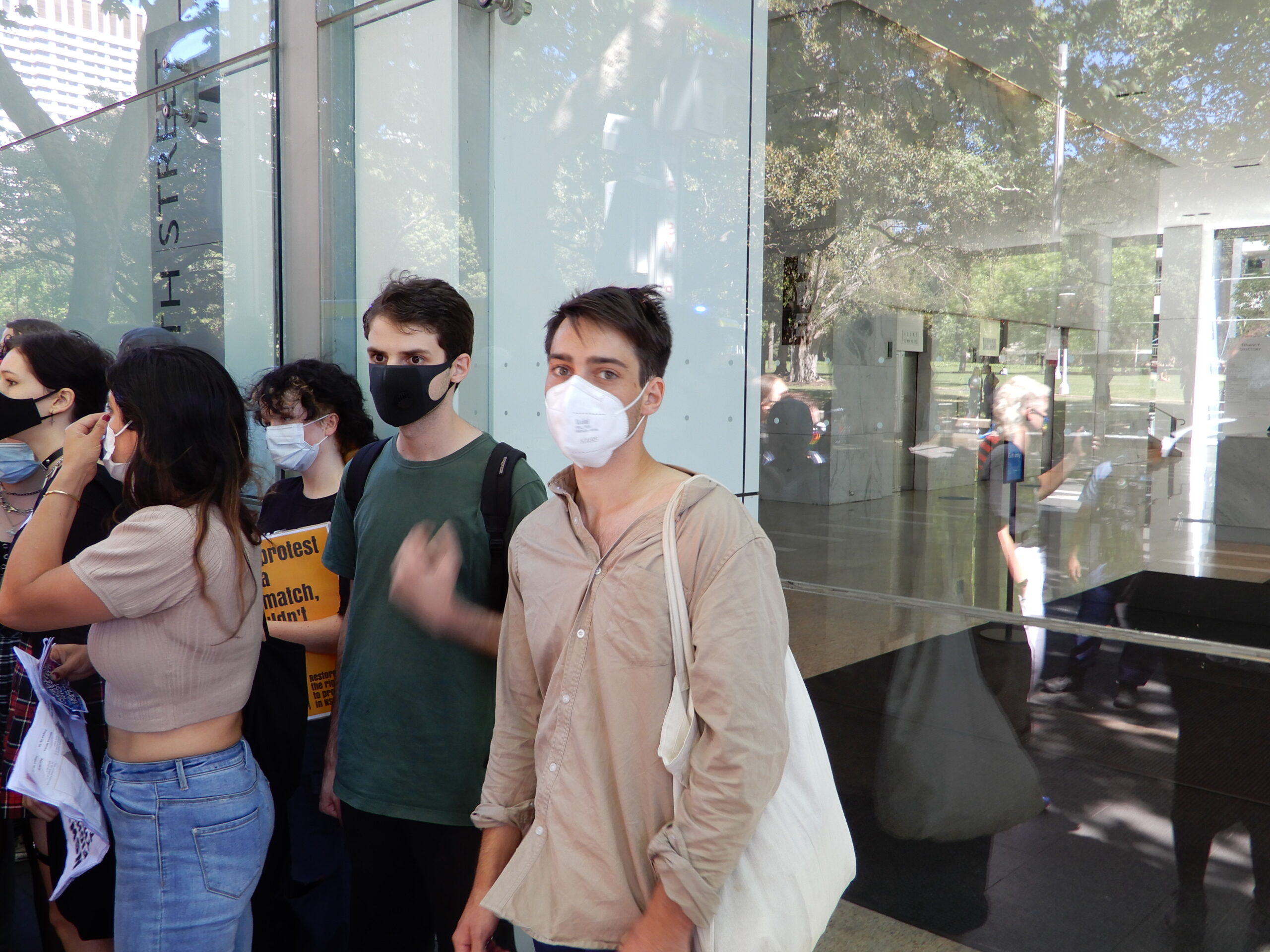
Firstly, the emails students have obtained date back to the end of May and show staff suggesting to police that students are breaching the COVID-19 public health order.
Jack, what are your thoughts on Sydney Uni management approaching police in this manner, and sharing information back and forth about its own students?
It’s important to say, it’s not surprising. Sydney Uni has a pretty long history of collaboration with the local police.
They did it during the strike campaigns in 2013 and 2017. They helped organise joint operations to break pickets.
So, it’s not surprising. But, as a student, it’s quite affronting to know that the list of organisers that NSW police has – and I am on – was actually compiled with the assistance of my own university. And they’ve basically denied it for the entire year.
Every time that we’ve questioned them about the police presence on campus, they’ve flat out denied that they’ve invited them on or collaborated with them.
So, all of this shows that to be untrue. It’s pretty outrageous.
You’ve singled out a line the protective services manager wrote to police in an email that reads, “I believe these protests may be ongoing and we may see growing traction due to staff cuts due to cost cutting occurring at the university”.
What does this indicate?
It kind of says it all. It says the university is aware that what they’re doing is extremely detrimental to staff working conditions and livelihoods, as well as to the quality of education that’s being delivered.
They know that it’s making people angry. And they know that it’s making people want to protest.
Their response to that is obviously not that they shouldn’t be squeezing more from staff and students, but it’s how best to defend themselves, by asking police to come and do the dirty work for them.
They’re extremely conscious of the dynamics of what’s going on. And what they’ve outlined in their communications with NSW police says it all really in terms of what the university thinks of us, the quality of education and livelihoods.
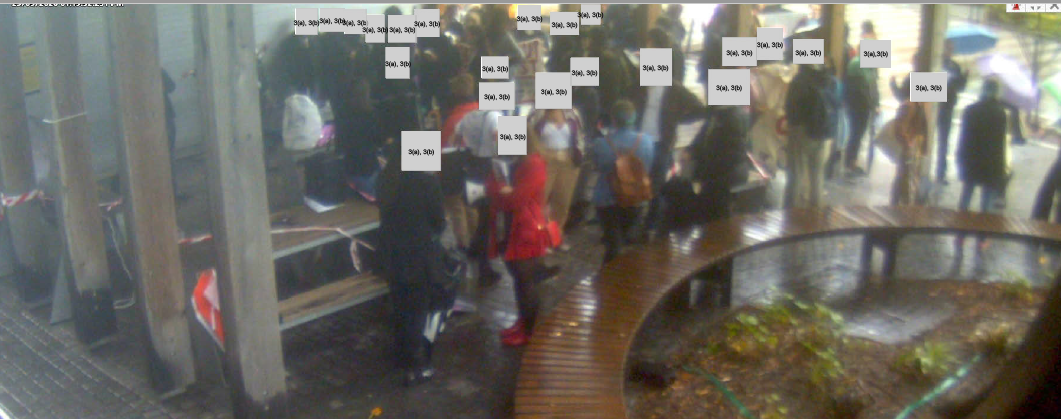
These emails are all from May. This was prior to NSW police enforcing the “for a common purpose” protest ban. Since late July, the police have had a particular focus on cracking down on Sydney University demonstrations.
Do you think it’s likely there’s been some more collusion going on between Sydney Uni management and law enforcement over the last couple of months?
It’s almost certain they’ve been in communication with one another about everything that’s been happening on campus.
Obviously, I don’t know the exact details. But with the fact that they did proactively give all this information over to the police, with the explicit intent of better preparing the crackdown on protest, I can’t see why they would have stopped as the months have rolled on.
The fact that they haven’t put out a public statement calling on the police not to repress student protest just shows this. It’s something that they could do.
We crashed the dean’s meeting the other day to ask questions. And the dean essentially said that they can’t stop the police doing anything, the onus wasn’t on them, and that the police can have any information they want.
But the university is proactively going to the police and giving them the information that will aid them in their task of shutting down protest, whereas they could be doing nothing – that would be a start.
They could not be opening up lines of communications with the police. They could also wage a public campaign, saying that protest is essential and that it’s a normal part of the functioning of a university.
But they haven’t done that. So, it’s definitely ongoing.
How would you describe the implications of uni staff colluding in this way, especially as the protests have been COVID safe, and the fines that apply at the moment are so steep?
Whenever the university goes on about how much it cares about free and open discussion and debate, and how much of a glorious shining light of liberal engagement it is, that’s all betrayed by the fact that when push comes to shove, they will side with NSW police in shutting down the very basic right of students and staff to have a voice and say about the future of education.
The implication is that Sydney Uni management are a bunch of frauds when they talk about free debate and open discussion, when actually, they just want to save their own skin.
Last Wednesday, the Job-Ready Bill passed federal parliament, and this Morrison government attack on higher education has led university management to propose hundreds of staff cuts as a result.
What does all this mean for higher education in this country?
We’re at a bit of a watershed moment for higher education. Clearly, the government has a vision of higher education purely as a commodity, not as a right – purely as something to be bought and sold.
The universities share that vision. The Group of Eight vice chancellors supported the bill in the end, on the basis that it didn’t really rock the way that they’re running their institutions.
They were guaranteed that they’d be able to extract that extra revenue out of students’ pockets and not have to make it up themselves.
The writing is on the wall. And it means that we have to keep up the momentum. For example, with the introduction of the fee increases, they all have to be ratified at the campus level as well.
The University of Sydney does have the right to set its subject fees in accordance with the maximum amount that’s being proposed by the government and is being raised by the bill.
So, they still have to go through a process of increasing fees. And we will definitely continue to fight around that.
So, the universities don’t have to increase their fees if they choose not to?
No, they don’t. They can set their fees up to the maximum prescribed by the government, which has just been lifted.
And lastly, police have kept up the assault on Sydney uni demonstrations, you’ve ascertained that the uni itself has been complicit in this, and meanwhile the attacks on higher education continue.
Jack, what’s the next step from here as far as the student movement is concerned?
We’re rallying on Wednesday 14 October at 1 pm at Sydney Uni campus. We’re doing that in conjunction with activists in the staff union. They’ve been very close allies in this fight.
What we need to do is involve masses of students in getting in the way and disrupting things, and in saying that the ordinary functioning of this university will not continue so long as students are facing these attacks.
It’s just become even more urgent, with the fact that the bill has just been passed.
But, also, at the end of the day, the only way that we’re going to win back the right to protest is with protest and taking that right back.
The fight for civil liberties and the fight for education are pretty clearly bound up together at the moment.


